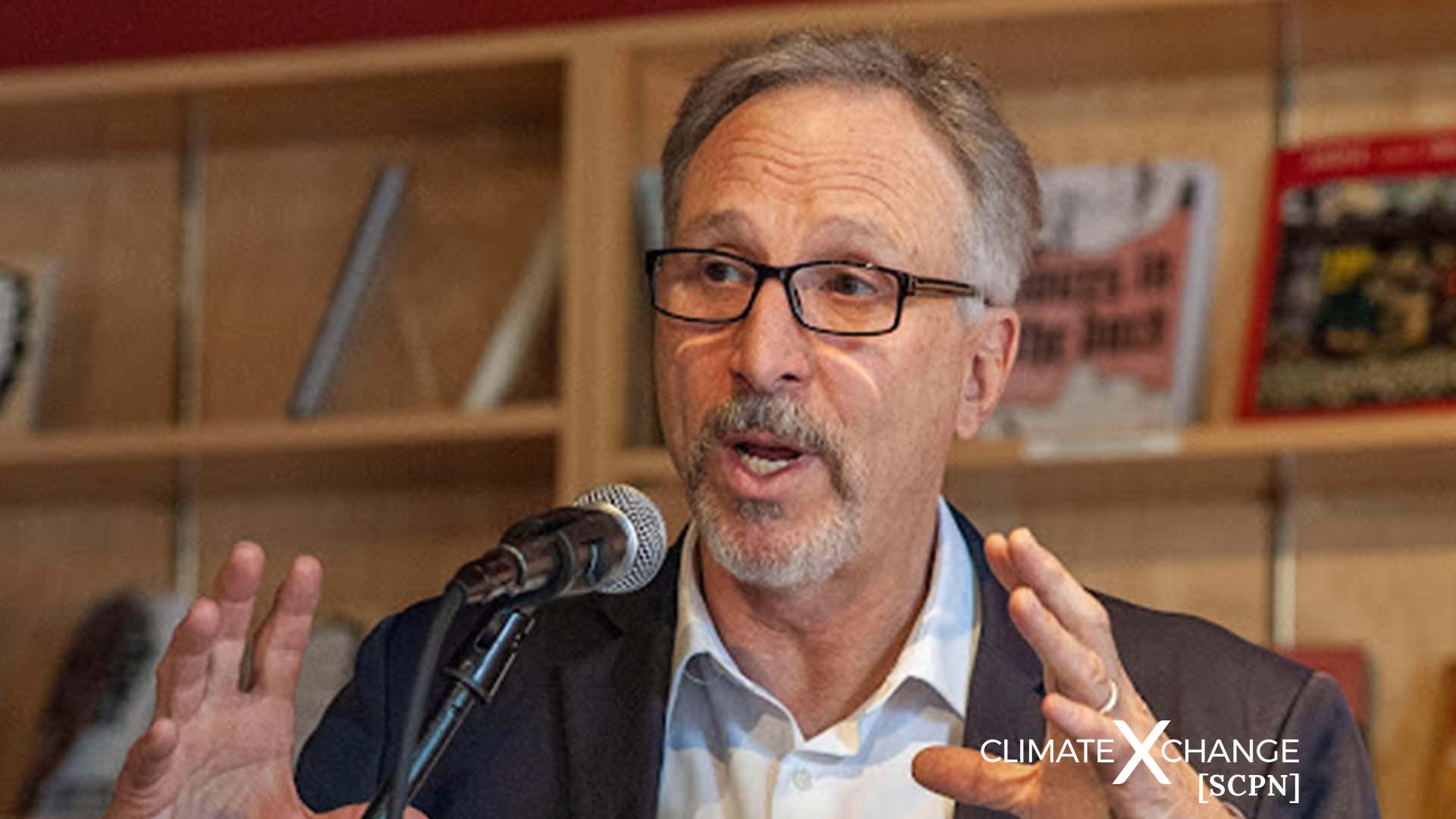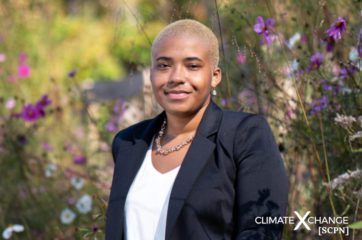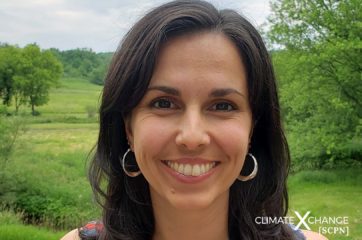All across the country, members of our State Climate Policy Network (SCPN) are fighting to make an impact on climate change in their communities. We have individuals in our Network from all 50 states, each experiencing climate change differently in their local areas and finding unique solutions to build resiliency efforts.
Glenn Schiffbauer is the Executive Director of the Santa Fe Green Chamber of Commerce, which works to build a sustainable community of businesses that are environmentally sound, economically viable and socially responsible through action, advocacy and education. Mr. Schiffbauer highlights the importance of renewable energy, defunding extractive industries, supporting local green businesses, and the economic incentives for doing so.
Emily Boettger: Hi Glenn, so nice to see you. How have you been?
Glenn Schiffbauer: Hi Emily, I’m doing well. Thanks so much for having me.
Emily Boettger: Of course, we’re happy to have you! I think the best place to start is to just have you tell us a bit about how long you have been in the climate space and what got you involved.
Glenn Schiffbauer: Well, my first little inkling into the climate space, as you call it, was in 2009. I was hired to be a project manager to build a home here for Robert Redford, who’s probably the first big celebrity climate activist and socially responsible entrepreneur there is. That project was very sustainable, and I was able to become educated in a wide array of energy efficiency and renewable energy building practices. When that project was finished, I thought, “this is the place to be”. And so, in the process of that exploration, I talked to a lot of different businesses, and I was speaking with the CEO of a local solar installation company. She said that she didn’t think selling solar panels was for me, but that she had another idea. She was part of a committee that had been looking into the formation of a Green Chamber of Commerce here in Santa Fe. And that sounded great to me. I’d never been in the nonprofit world, but it sounded really intriguing because it wasn’t just solar, it wasn’t just LED lighting, and it wasn’t just geothermal or building practices, it was everything. I found over the years that I’m more comfortable being a mile wide and an inch deep than I am going into the deep dive in any one thing. So that’s how I got started.
Emily Boettger: Well, it’s sort of a perfect transition, I was just going to say, could you explain for us the work that the Green Chamber of Commerce is doing and how you make it happen?
Glenn Schiffbauer: We started out pretty much like any typical Chamber of Commerce, soliciting members, hosting networking events, and were trying to do everything we could to help those businesses succeed and become an educational resource for them. But that didn’t totally fit all that well with some of our values and our mission. Now, we still have those kinds of things. We have 165 business members now, and during COVID, we were trying to do our best to act as a resource for all the programs that might help them. Technically, we were and still are being pretty lenient on membership dues, just because so many small businesses are really hurting. So we’ve been trying to do as much as we can for them. But we’ve also evolved to a more boots-on-the-ground type of organization.
My office is about a block away from the state capitol here in New Mexico, so we’ve always been active when it comes to advocacy and lobbying. Having that advocacy and lobbying presence really garnered some recognition for the work that we could do. We’ve been working on methane mitigation since 2014. The Environmental Defense Fund contacted me looking for somebody to manage the economic part of it, the loss, royalties, all that stuff. I think they felt they had the environmental and the health hazard components of that issue covered, but they wanted someone on the financials. So that was in 2014, and we grew the coalition to probably about 15 environmental groups. And in 2016, the Obama administration signed the Protect Our Public Lands Act, which lasted about three months until the incoming [Trump] administration rescinded it. So we’ve been doing things like that and we’ve also been active in all kinds of different lobbying.
New Mexico is so dry, if you’ve been here, you know. It’s a high desert, and we don’t have that stuff called water here. Santa Fe is also known as one of the leading per capita water use cities in the country, so we started the Next Generation Water Summit. We just finished our fourth one in June, which was all virtual. We bring together water experts and climate scientists to talk about how to reduce and reuse, and what the new technologies are that will be helpful with this finite amount of water that we have on the planet. That has become a really big part of what we’re doing. We developed the program with the city, Santa Fe Community College, and certified water auditors. We are soliciting businesses to send these auditors and show them how to conserve water.
Again, our partnership there is not just saying that the right thing to do in the West is to save as much water as you possibly can, but also that it hits the bottom line; it’s also a commerce issue. And we’ve been pretty successful. It’s a one of a kind program: it’s job creation, it’s economic development, and it’s conservation. So we’ve been pretty happy with what’s come out of that. We started with restaurants, and now we’re doing all different types of businesses and are probably going to expand the program to other cities in New Mexico, because it is so unique.
Emily Boettger: That’s wonderful. And I think it’s really important to get to see how, at the end of the day, all of these climate issues do have economic impacts, as well. I was wondering if you could explain how you see the business sector and the climate space interacting, and how they intersect.
Glenn Schiffbauer: I think their intersection is crucial. You know, business has always had, in my mind, some responsibility, but also a leadership role in any environmental and social issue, even going back to the civil rights era. That was a very contentious time. But at some point, the tipping point became where some of these restaurants in the south and businesses in the south said, “I don’t care what the law is, I’m losing money and I don’t want to cut out a whole sector of the market.” Individuals and businesses taking a stand have a real impact on any issue. When it comes to climate, if we look at 2017 when we were going to be pulling out of the Paris Climate Accord, big businesses said: “No thank you. We prefer that the U.S. stay in. But even if you don’t, we will.” That has a huge impact. When you have Bank of America, Goldman Sachs, Coca Cola, GE, and all these big businesses saying, “We think this is the right thing to do for not just us, but for the country.” I think that those kinds of things really have an impact.
Emily Boettger: Yeah, certainly. On a smaller scale, how do you feel that supporting local green or sustainable businesses impacts communities in any way?
Glenn Schiffbauer: Absolutely. I mean, from an economic standpoint, most of us in this climate and sustainability space recognize the multiplier effect of spending your dollars locally. If you spend one dollar in Santa Fe at a local business, 45 cents of that stays here, instead of 14 cents if you go to Walmart, or any other big box store. So that’s one of the things that we’ve tried to be effective at messaging to the community. Where you spend your money really does impact what we’re doing here. You know, that’s more money in our local communities’ tax coffers. So every time you hit a pothole, think about maybe I should have spent that at the local bookstore, instead of ordering online. Obviously too, there are the benefits of the lower carbon footprint caused by shopping locally and the shorter supply chain. Things like that are very important to local small businesses.
Emily Boettger: Definitely. Aside from the work you do with individual organizations and businesses, what kinds of work do you do with policymakers and advocates on the ground? You talked about it a bit in the beginning, but could you elaborate?
Glenn Schiffbauer: Oh, yeah, we lobby. We are, I think, the de facto business voice for all of the other environmental groups who are a part of the coalition here. The main players for environmental policies here in New Mexico are the Natural Resources Defense Council, the Sierra Club, the Environmental Defense Fund, and some of the smaller wildlife organizations. We are usually the chosen voice to talk about socially responsible business practices, and again, how it impacts the bottom line or the financial well being of the State of New Mexico. Last year, I spearheaded the legislation for New Mexico to become a Benefit Corporation Act recognizing state.
Emily Boettger: That’s fantastic. How do you feel that green business and sustainability could be better supported on a state and federal level? What changes do you see as possible or potentially helpful?
Glenn Schiffbauer: Well, it’s difficult, especially in the states here. I mean, one thing that could be beneficial would be to divest from extractive industries that have for so long ruled, because they provide so much of our state’s revenue. I’m hopeful that with our federal administration, our local and our state administrations, with Governor Michelle Lujan Grisham, that they’re starting to recognize that maybe it hasn’t been such a level playing field. That extractive industries always bemoan the fact that “solar has to be subsidized and wouldn’t stand on its own,” but they always fail to mention that they’ve been subsidized since 1970. So I think that both the state and federal governments probably recognize it, but once they finally say, “enough of that, let’s just make things right,” then change will happen.
There’s a reason they’re subsidizing, to make that energy available to everybody, not just the rich people. For national security, we need all that energy available. So I think that kind of recognition from state and federal levels will also help with enforcing some of the environmentally damaging practices that extractive industries are getting away with, and not having to pay for. Our state is working on some pretty strong methane rules. Oil and gas have always said, “Well, you know, it costs too much, you’re gonna put the little guy out of business.” But I think, recognizing that sometimes the little guy has a poor business model and shouldn’t be in business is essential too. You can’t have a donut shop and say, you know, it’s really expensive for me to adhere to all these health practices. I don’t want to do that. Right?
Emily Boettger: Yeah, absolutely! Finally I wanted to ask what is currently motivating you in the climate space? What’s something on the horizon that you are feeling hopeful about?
Glenn Schiffbauer: The aridification of the West is a big motivator, especially through the water summit. Our keynote speaker in June was Katharine Hayhoe, who’s the Chief Scientist for The Nature Conservancy and the UN’s Climate Champion of the Earth Award winner. And the message has been clear over the last three years that we’re not in a mega drought, this is just the way it’s going to be. That motivation is pretty strong, especially when you’re living in a place where there’s 12 inches of rain a year, the snowpack that used to last until August is gone in April, and with the wildfires that we have in the West, the reservoirs that are at one percent of their capacity. That’s all the stick part. The carrot part is that we still have a shot through methane capture, electrifying the transportation sector, and in New Mexico, we have the potential to be the largest producer of renewable energy anywhere in the country.
These large renewable projects that are starting to pop up are the kind of things that show that people are paying attention, and we may not get back to the way it was last year or five years ago. But maybe we can keep it from getting worse. The tough part is we are a big agricultural state. We don’t have a lot of water and we don’t use it well. We flood irrigate our biggest crops, and that’s 70 percent of our water usage in this state. But we can make that better, too. On a larger level, the keynote that Dr. Hayhoe gave was about how we need to talk about it. Thankfully organizations like yours and mine are. We’ve been beating the drum for a long time. But slowly and surely, I think some people are starting to listen and at least engage in conversations where we can talk about our shared values, and why, going forward looking at your unborn grandkids’ future, you should be thinking about these things.
Emily Boettger: I couldn’t agree more. Thanks so much for the work you’re doing and talking with us today!
Glenn Schiffbauer: Thanks Emily. Have a good one.
Check out the Santa Fe Green Chamber of Commerce and more information about Glenn Schiffbauer here!
Information about the May 2022 Next Generation Water Summit can be found here!
You can reach Mr. Schiffbauer at glennschiffbauer@gmail.com if you have any questions, comments, or would like to connect!









